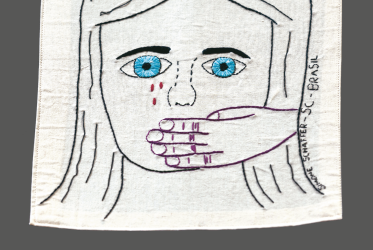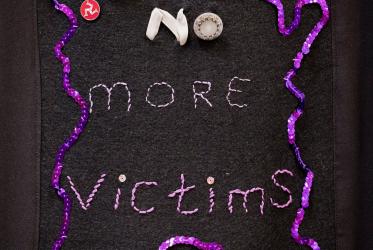Suzan Mark Zira is a female theologian from Nigeria and a member of the Church of the Brethren in Nigeria (EYN). She served as principal of EYN’s John Guli Bible School for 17 years and is the current academic dean of Kulp Theological Seminary in Adamawa State, Nigeria. She was director of EYN’s Women’s Fellowship for six years and Women’s Ministry for four years. She also led the Mission 21 Women’s Network in Africa for six years.
Speak Out Boldly
Scripture: Numbers 27:1–11
27 Then the daughters of Zelophehad came forward. Zelophehad was son of Hepher son of Gilead son of Machir son of Manasseh son of Joseph, a member of the Manassite clans. The names of his daughters were: Mahlah, Noah, Hoglah, Milcah, and Tirzah. 2 They stood before Moses, Eleazar the priest, the leaders, and all the congregation, at the entrance of the tent of meeting, and they said, 3 “Our father died in the wilderness; he was not among the company of those who gathered themselves together against the Lord in the company of Korah but died for his own sin; and he had no sons. 4 Why should the name of our father be taken away from his clan because he had no son? Give to us a possession among our father’s brothers.”
5 Moses brought their case before the Lord. 6 And the Lord spoke to Moses, saying: 7 The daughters of Zelophehad are right in what they are saying; you shall indeed let them possess an inheritance among their father’s brothers and pass the inheritance of their father on to them. 8 You shall also say to the Israelites, “If a man dies, and has no son, then you shall pass his inheritance on to his daughter. 9 If he has no daughter, then you shall give his inheritance to his brothers. 10 If he has no brothers, then you shall give his inheritance to his father’s brothers. 11 And if his father has no brothers, then you shall give his inheritance to the nearest kinsman of his clan, and he shall possess it. It shall be for the Israelites a statute and ordinance, as the Lord commanded Moses.”—Num. 27:1–11 (NRSV)
The Text in Its Context
Normally, land inheritance in Israel would pass from a father to his sons, not to his daughters. This passage contains the story of the daughters of Zelophehad presenting their case to receive their father’s inheritance rather than having it pass on to other Israelite clans, and to have the Lord's determination in their favour.
We are urged to imitate these daughters of Zelophehad, heroines of faith. By asking an unusual thing, these five remarkable young women are a picture for us of faith in action. Their father had died in the wilderness, part of that generation which God had said would not enter into the land into which Israel is about to enter. Zelophehad’s daughters remind Moses that their father had not been part of the rebellion of Korah. Thus, though he had died in the wilderness, he was not part of those who had forfeited their inheritance, and so they ask for that inheritance.
This story takes place in the wilderness, just before the Israelites entered into the promised land. Therefore, all that is being done, is done in faith; Israel does not yet have an inch of land. The Israelites are simply trusting in God's promise that they will have the land and, acting in faith, are already dividing it up among themselves.
Zelophehad’s name will be lost among the tribes of Israel and the clans of Manasseh, and his daughters feel that everything is against them. Yet, no one had ever contemplated a situation like this before. Moved by courage, boldness, and faith, the young women realize that there might be a chance—if they ask—that they could have their inheritance.
Faith is key here. As in any age, faith is the watchword for blessing. There is nothing from God that will come into one’s life apart from the channel of faith. No blessing, no achievement, no victory can ever be one’s own, except if one takes it by faith. As such, faith in the age of our scripture passage, and in our own age, is the key to obtaining God’s blessing.
These young women are aware that God had promised Israel an inheritance in the land of Canaan. They know this history, and knowledge is power. They know that the promise involved a land flowing with milk and honey; a land of beauty, fruitfulness, and blessing. And they desire to have the part of this promise that belonged to them. They are determined, despite discouraging cultural and religious factors—the cultural gender discrimination of the law and customs of Israel that said that their father had lost the family inheritance because he had no male child.
The Text in Our Context
In Israel, all inheritances were to be passed to a male, regardless of age and status. The system was completely unfair to women. This kind of cultural gender discriminative norm is what women are experiencing throughout Nigeria. Women are denied the right to the inheritance of either their father or their husband.
In Nigeria, especially in the north-eastern part of the country where I live, traditional cultural norms deny women the right of inheritance and ownership. This has long been the major reason that women live in poverty and are marginalized. Women are considered part of a man’s property. This has made many women vulnerable during the ongoing insurgency in the country, especially in the Northeast.
In terms of education, males are educated more than females, as society gives more educational opportunities to boys and young men. Only female students are expelled from school if they are found to be sexually active, while their male counterparts may continue with their studies. Rape of women is so rampant because of the culture of silence. Indeed, the plight of women in this region cannot be overemphasized.
This passage has given us an example of how women can, by faith, boldly raise and talk about their situation, and end up as agents of change—something every woman can become. Keeping quiet will never bring about change. Women must talk about how they are feeling, with boldness, by faith, against the culture of silence and suffering. Faith challenges tradition; we must therefore be ready to move in new ways against universally accepted ideas and traditionally held views. If we would walk by faith, we must make choices that take us off the commonly accepted path.
These women’s act of faith formed the basis of a new principle, a new law. A whole new area of action opened up. We need daughters of Zelophehad of our time, who can take bold steps of faith that bring about new understanding about the treatment of women. Women need to have faith to act against cultural norms that work against them. Keeping quiet is equal to supporting the evil. Women, speak out for your rights; men, speak out for women’s rights. Jesus said, if you have faith, even small like a grain of mustard, it will remove mountains, it will cause trees to be cast into the sea and other things to happen. When we begin to exercise faith, we encourage someone else to exercise faith too. Who knows what God is going to do in our time through us? God is calling on us to live by faith. This is God’s way of changing human history.
Questions
The people of Israel numbered over a million, yet the daughters of Zelophehad appear before the leader and the people to make known their demand. It must have been an unusual circumstance and sight for the women of Israel in particular.
- What do you think made them act in this unusual way?
- What made them think they ever had a chance to inherit this land?
- Why were they determined to ask for this when they knew it went against the law?
- What was it that made them hope like this?
- Do you have experiences in your context that are like those of the daughters of Zelophehad?
- Are there examples from your context when women have acted in the same way as the daughters of Zelophehad?
Activities
These young women took time to talk about their plight and situation and, in the end, came up with an agreement and understanding that the promised land was a gift of God’s grace to the people of Israel, which meant it had nothing to do with the realm of custom and law. Grace is not one’s right; it is a gift that is for all, unless we bring culture into it. Therefore, we should speak out; keeping quiet will not solve or end women’s plight.
- Find an example in your context where you as a group could make a difference regarding the plight of women, either by taking action or by raising your voices.
Resources
Adeyemo, Tokunboh, ed. Africa Bible Commentary. Grand Rapids, MI: Zondervan, 2006.
Adeyemo, Tokunboh, ed. Sharhin Littafi Mai Tsarki Don Afirka. Jos: Africa Christian Textbooks, 2019.
Henry, Matthew. Complete Commentary on the Bible.
NIV Study Bible. Grand Rapids, MI: Zondervan.
Prayer
Our Father, awaken our faith anew. Teach us to take our burden to you in faith and speak out. Lord, teach us to walk by faith. In Christ's name, Amen.





